When it comes to heavy hitting cartridges designed for use in Modern Sporting Rifles, hunters and shooters only have a few real choices these days. Here’s what you need to know about the 450 Bushmaster vs 458 SOCOM vs 50 Beowulf.
While most hunters and shooters would probably agree that Modern Sporting Rifles chambered in .223 Remington are great for general plinking, more serious target shooting, and varmint hunting, using the diminutive cartridge on larger game is a very contentious subject. The AR-platform is the most popular style of rifle in the United States and offers many inherent advantages for hunters, so designers have made many attempts at building more powerful cartridges for the AR-15 over the years.
Unfortunately, those same designers must also operate within relatively severe constraints when building larger bore cartridges that will reliably function in an AR-15. For that reason, hunters desiring a big bore AR currently only have three mainstream choices: the .450 Bushmaster, the .458 SOCOM, and the .50 Beowulf. All three cartridges are solid performers and there is quite a bit of overlap in their capabilities. That being said, each has different strengths and weaknesses that you should be aware of before purchasing one.
Today, I’m going to discuss the pros and cons of the 450 Bushmaster vs 458 SOCOM vs 50 Beowulf so you can make an informed decision on which cartridge is best for your particular situation.
Before we get started, I have an administrative note:
Some of the links below are affiliate links. This means I will earn a small commission (at no extra cost to you) if you make a purchase. This helps support the blog and allows me to continue to create free content that’s useful to hunters like yourself. Thanks for your support.
Additionally, I recorded an entire podcast episode on the various cartridge options for the AR-15 (to include the .450 Bushmaster, .458 SOCOM, and .50 Beowulf). If you’d rather listen than read, click the appropriate link below to listen to this episode on your preferred podcasting service.
450 Bushmaster vs 458 SOCOM vs 50 Beowulf Podcast
Apple | Google | iHeart | Spotify | Stitcher
450 Bushmaster vs 458 SOCOM vs 50 Beowulf: History
The story of the .450 Bushmaster, the .458 SOCOM, and the .50 Beowulf all start with the .223 Remington and the AR-15.
Just a few short years after replacing the M-1 Garand and the .30-06 Springfield with the M-14 battle rifle and 7.62x51mm NATO in the 1950s, the US military again began the search for a new rifle and cartridge. The military eventually settled on the high velocity 5.56x45mm cartridge and the M-16 rifle, a military adaption of the civilian AR-15, which was itself a scaled down version of the AR-10.
Derived from the .223 Remington (also known as the .223 Rem), the original M193 ball load for the 5.56x45mm fired a .224″ 55 grain full metal jacket bullet at 3,250 feet per second (1,290 foot pounds of energy). The rifle and cartridge suffered through major teething problems during the Vietnam War, but modifications to the rifle and the propellant used in the cartridge eventually solved most of those issues.
NATO conducted extensive testing after the Vietnam War in an effort to supplement the 7.62x51mm NATO with another standardized rifle cartridge for the members of the alliance. They ended up settling on the Belgian SS109 variant of the 5.56x45mm. Known in the US military as the M855, the new NATO ball load fired a 62 grain full metal jacket bullet at 3,025 feet per second (1,260 ft-lbs of energy). Often referred to as “green tip ammo” because of the green paint on the bullet, the US Air Force, Army, Navy, and Marine Corps formally adopted the M855 along with the updated M-16A2 rifle during the 1980s.
The M855 bullet incorporated a steel penetrator, which markedly improved the penetration capabilities of the round compared to the old 55gr M193 load. By and large, those who used the M193 in combat considered the terminal performance of the bullet adequate. However, many Soldiers and Marines who used the M-16A2 in combat during the 1990s and early 2000s complained about the poor stopping power of the M855 ball round.
Civilian interest in the AR-15 and .223 Remington cartridge grew over the years, particularly for varmint hunting and target shooting. However, many big game hunters had concerns similar to those shared by many in the military regarding the effectiveness of the .223 Remington cartridge on deer sized game.
These issues led to the development of several larger caliber cartridges featuring heavier bullets designed to function in AR-15 rifles like the .300 Blackout, 6.5 Grendel, the 6.8 Remington SPC (also known as the 6.8 SPC), the .450 Bushmaster, the .458 SOCOM and the .50 Beowulf during the 1990s and early 2000s.
We’ll start with the .450 Bushmaster.
Colonel Jeff Cooper described a rifle he called the “Thumper” in some of his writings. Basically, he thought an ideal hunting firearm was a semi-automatic rifle .44 caliber or larger that was capable of taking large game out to 250 yards. The .223 Remington obviously did not fill the need for a heavy hitting big bore cartridge. However, Tim LeGendre of LeMag Firearms decided to build a hard hitting .45 caliber cartridge developed using a cut down .284 Winchester case designed for use in the AR platform. He called the new cartridge the .45 Professional.
LeGendre licensed the cartridge to Bushmaster, who in turn collaborated with Hornady in bringing the project to market. Hornady and Bushmaster made some slight modifications to .45 Professional and released the new cartridge as the .450 Bushmaster (sometimes called the .450 BM for short).
The new straight walled cartridge functions in the AR-15 platform and, pushing a .452″ 250gr bullet at 2,200 feet per second (2,686 ft-lbs of energy), delivers the bone crushing performance out of an easy to handle semi-auto rifle just like Colonel Cooper originally envisioned.
The .458 SOCOM came on the scene via a slightly different route.
After hearing members of the United States Special Operations Command (SOCOM) lament the ineffectiveness of the 5.56x45mm cartridge in combat, particularly during the infamous Battle of Mogadishu in 1993, Marty ter Weeme of Teppo Jutsu LLC decided to develop a new, much more powerful cartridge for the M-16/M-4/AR-15 series of rifles.
He used a lengthened .50 Action Express (.50 AE) case with a rebated rim (down to .473″ from .515″) as the basis for the new cartridge and loaded it with a .458″ bullet. Firing a 300 grain bullet at 1,845 feet per second, (2,267 ft-lbs of energy), the .458 SOCOM packs a heck of a punch into a relatively small package and still functions very well in the standard AR platform with a variety of barrel lengths.
Last, but not least, is the .50 Beowulf.
Designed by Alexander Arms, the .50 Beowulf was actually the first of these three big bore AR cartridges to hit the market and, firing .500″ bullets, is the largest of the group.
Like the .458 SOCOM, the .50 AE is also the parent case of the .50 Beowulf. However, the Beowulf has a much more heavily rebated rim (down to .447″ instead of .473″ for the .458 SOCOM) and, similar to the .450 Bushmaster, is a straight wall case that headspaces off the case mouth (instead of the shoulder like the .458 SOCOM).
Even though it shoots larger diameter bullets than the .450 Bushmaster and the .458 SOCOM, the .50 Beowulf is still roughly comparable to the Bushmaster and SOCOM cartridges in terms of power. For instance, one popular load by Alexander Arms fires a 350 grain bullet at 1,771 feet per second (2,437ft-lbs of energy).
450 Bushmaster vs 458 SOCOM vs 50 Beowulf: Cartridge Sizes
As you can see in the photo below, the .450 Bushmaster, .458 SOCOM, and .50 Beowulf share many similarities, but there are some obvious differences between them as well.
First, all three cartridges are very similar in overall length: 2.26″ for the .450 Bushmaster and .458 SOCOM and 2.25″ for the .50 Beowulf. The AR-15 can only accommodate cartridges up to 2.26″ long, so all three go right up to the limit that will fit in the rifle.
At 1.7″, the .450 Bushmaster has a longer case length than the .458 SOCOM (1.575″) and .50 Beowulf (1.65″).
The .450 Bushmaster and .458 SOCOM have a .473″ rim diameter, which is the same as other popular cartridges like the .30-06, .308, and .270 Winchester. On the other hand, the .50 Beowulf has a .447″ rim diameter, which is the same as the 7.62x39mm cartridge used in the AK-47.
Both the .450 Bushmaster and .50 Beowulf are straight walled cartridges while the .458 SOCOM has a very small shoulder.
Each cartridge also uses different diameter bullets: .452″ for the Bushmaster, .458″ for the SOCOM, and .500″ for the Beowulf.
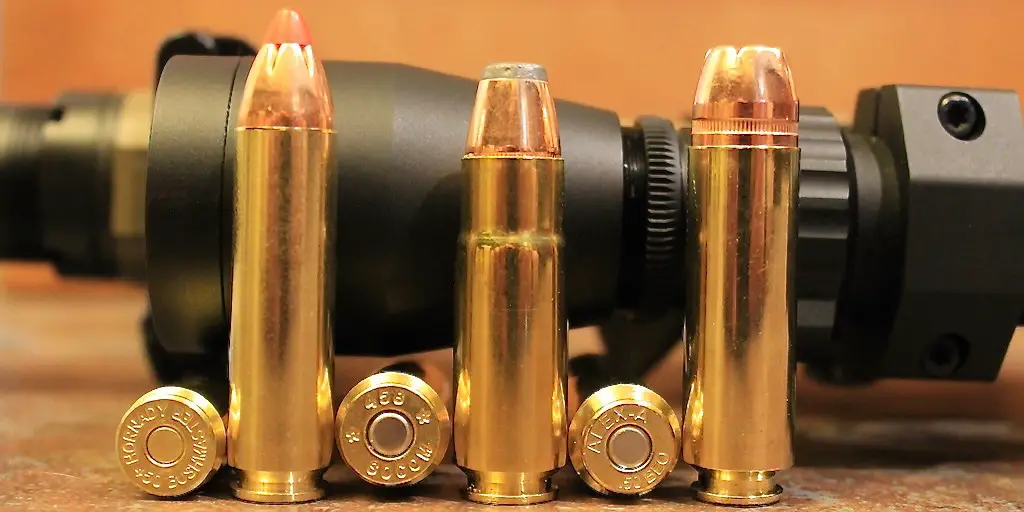
Most .450 Bushmaster ammo typically has bullet weights in the 158gr to 300 gr range, with 250gr and 260 gr bullets being the most popular. The .458 SOCOM uses 200gr to 600gr bullets, with 250gr, 300gr, and 350gr being the most common. Finally, 200gr to 600gr bullets are typical with .50 Beowulf factory ammo while 335gr, 350gr, and 400gr bullets are most popular.
Finally, while they are all generally loaded to similar pressure levels, the .450 Bushmaster is the only SAAMI certified cartridge of the bunch and has a maximum average pressure of 38,500psi.
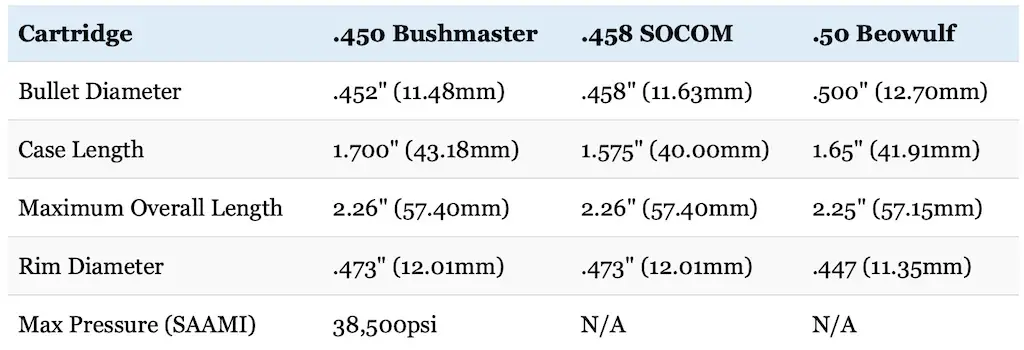
450 Bushmaster vs 458 SOCOM vs 50 Beowulf Ballistics
As you might guess by looking the cartridges themselves, the .450 Bushmaster, .458 SOCOM, and .50 Beowulf have very similar ballistics. In fact they’re all roughly comparable to the .45-70 Government. .45-70 ammo can be roughly divided into two broad categories: low pressure ammunition safe to use in the old Trapdoor Springfield and high pressure “Magnum” ammunition designed for use in modern rifles like the Marlin Model 1895 or Ruger No 1.
Table below compares the .450 Bushmaster, .458 SOCOM, and .50 Beowulf to both categories of .45-7o ammo.
Specifically, it shows a 250gr Hornady FTX load (.210 BC) in .450 Bushmaster, a 300 gr SBR JHP load (.197 BC) in .458 SOCOM, and a 350gr Alexander Arms XTP (.145 BC) in .50 Beowulf load compared to 405gr Remington Core-Lokt (.281 BC) and 350gr Buffalo Bore loads (.232 BC) in .45-70 Government.
This data is for Alexander Arms, Buffalo Bore, Hornady, Remington, and Southern Ballistic Research (SBR) factory loads using a 150 yard zero.
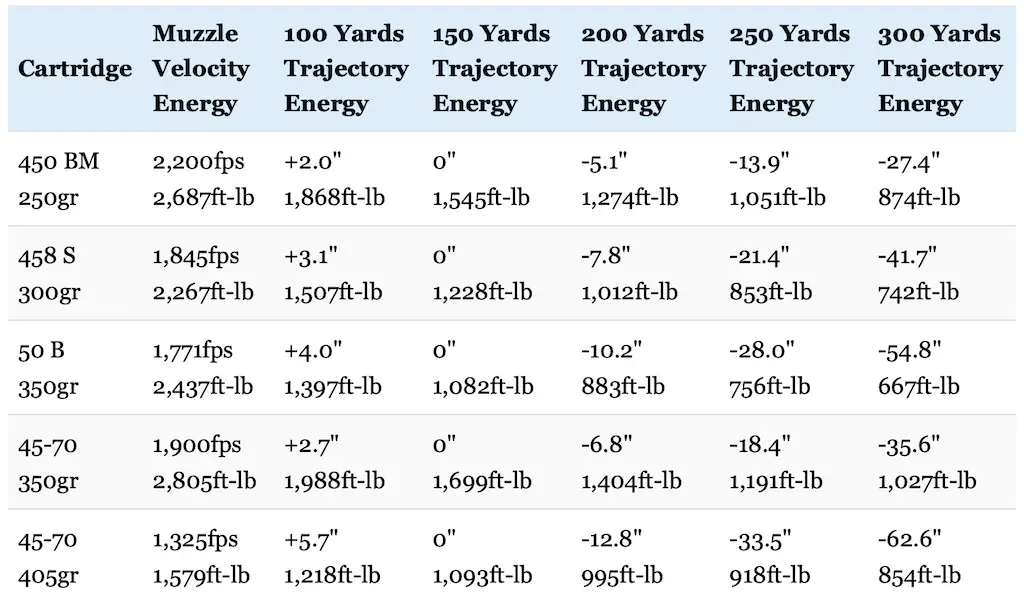
As you can see, while there are indeed some small differences in the ballistics of the three cartridges, they all fall neatly in between the low and high pressure .45-70 loads in terms of power and trajectory. Due to the higher muzzle velocity of the cartridge, the .450 Bushmaster has the flattest trajectory and retains the most energy of the bunch while the .50 Beowulf comes in last in both categories.
Indeed, the .450 Bushmaster has a clear advantage over the .458 SOCOM and .50 Beowulf out past 200 yards. Heck, it even has a slightly less arching trajectory than the high pressure .45-70 load
That being said, when you consider that they’re all designed to be hard hitting cartridges at short to moderate range, there isn’t a tremendous difference between them.
The chart below compares how much a 10 mile per hour crosswind impacts those same .450 Bushmaster, .458 SOCOM, 50 Beowulf, and .45-70 loads out to 300 yards.
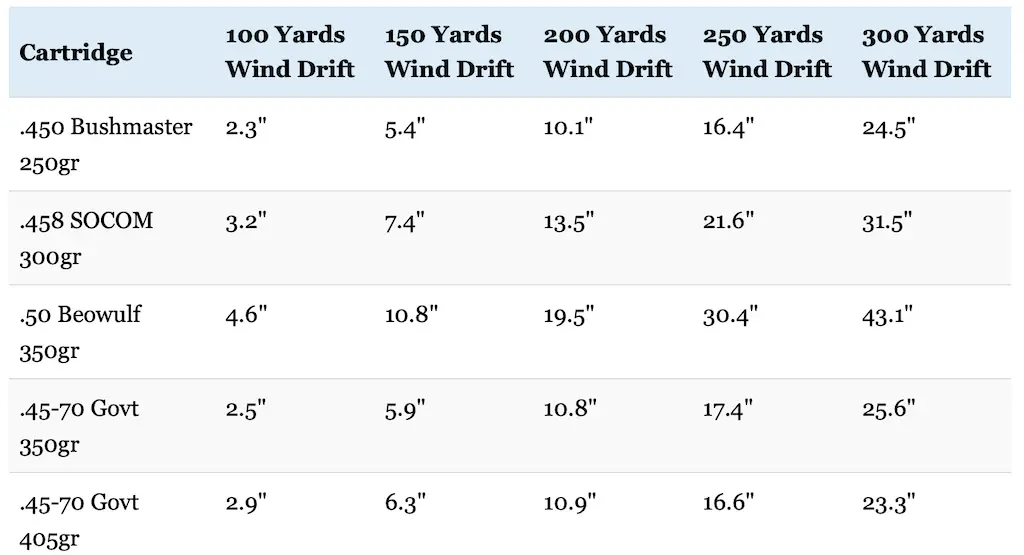
Once again we see that the .450 Bushmaster load outperforms all the others in terms of wind drift and the .50 Beowulf comes in last. However, they are all very similar at normal hunting ranges.
The table below compares the recoil produced by those same loads when fired from a Ruger AR-556 (.450 Bushmaster), a Wilson Combat Ultimate Hunter (.458 SOCOM), an Alexander Arms Tactical (.50 Beowulf), and a lever action Marlin Model 1895 (.45-70 Govt).
I recognize that this is not a true “apples to apples” comparison, which is impossible since those four cartridges are not all available in the exact same rifles. I did my best to compare rifles of a similar weight, but consider the recoil figures below to be an approximation. That being said, the results are still interesting.
Felt recoil will vary from shooter to shooter and rifle to rifle, but free recoil energy is still a useful way to compare cartridges.
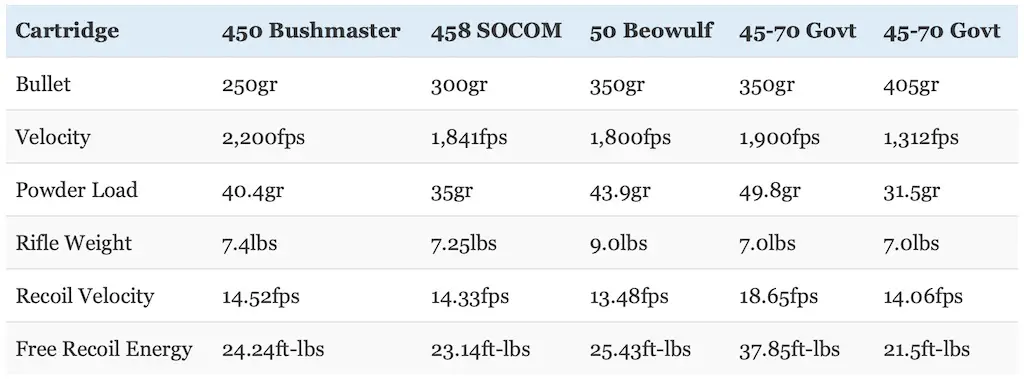
As you can see, recoil is pretty comparable between the .450 Bushmaster, .458 SOCOM, and .50 Beowulf. Interestingly, their recoil is only slightly more than the low pressure .45-70 load and considerably less than the high pressure .45-70 load when fired from a slightly lighter Marlin Model 1895 rifle.
As a side note, the .50 Beowulf does have slightly more recoil energy than the .450 Bushmaster and .458 SOCOM in the above table, but that’s due in large part to the fact that the .50 Beowulf load was being fired from a heavier rifle. For comparison, that same Beowulf load would produce 30.5 ft-lbs of free recoil energy when fired from a 7.5 pound rifle.
450 Bushmaster vs 458 SOCOM vs 50 Beowulf: Ammunition Selection
Of the three, the .450 Bushmaster is by far the most common, but it still can’t hold a candle to cartridges like the .223 Remington or .308 Winchester. The .458 SOCOM and .50 Beowulf are not SAAMI certified and no major ammunition companies produce ammo for them. Instead, a handful of much smaller companies produce factory ammo for those two cartridges.
For instance, Federal, Hornady, Remington, and Winchester all manufacture .450 Bushmaster ammo. SBR produces several different variants of .458 SOCOM ammo and Alexander Arms manufactures the majority of .50 Beowulf ammo. Additionally, Black Butterfly and Buffalo Bore both produce .450 Bushmaster and .458 SOCOM ammo while Inceptor, Great Lakes, Underwood all sell factory ammo for all three cartridges. Other companies sometimes sell .50 Beowulf ammo listed as 12.7x42mm.
With factory ammo prices usually starting around $1 per round and quickly going up from there, ammunition is pretty expensive for all three cartridges. The .450 Bushmaster is often somewhat less expensive than the other two though.
BUY SOME GREAT 450 BUSHMASTER AMMO HERE
BUY SOME HIGH QUALITY 458 SOCOM AMMO HERE
BUY SOME EXCELLENT 50 BEOWULF AMMO HERE
If you’d like to learn more about some of the various hunting ammunition choices for the 450 Bushmaster, read this article:
Best 450 Bushmaster Ammo For Hunting Deer & Other Big Game
Reloading is also relatively popular among those who enjoy shooting the .450 Bushmaster, .458 SOCOM, and .50 Beowulf. Fortunately, all three cartridges shoot bullets in use by other, relatively well established cartridges.
The .45 Colt, .454 Casull, and .460 S&W all use .452″ bullets like the Bushmaster while the .50 AE and .500 S&W use .500″ bullets like the Beowulf. However, the .458 SOCOM has a big advantage in this category since it uses the .458″ bullets like the .45-70 Government, .450 Marlin, .458 Win Mag, .458 Lott, and .460 Weatherby. Heck, it even shares the same bullet diameter as the old .450 Nitro Express.
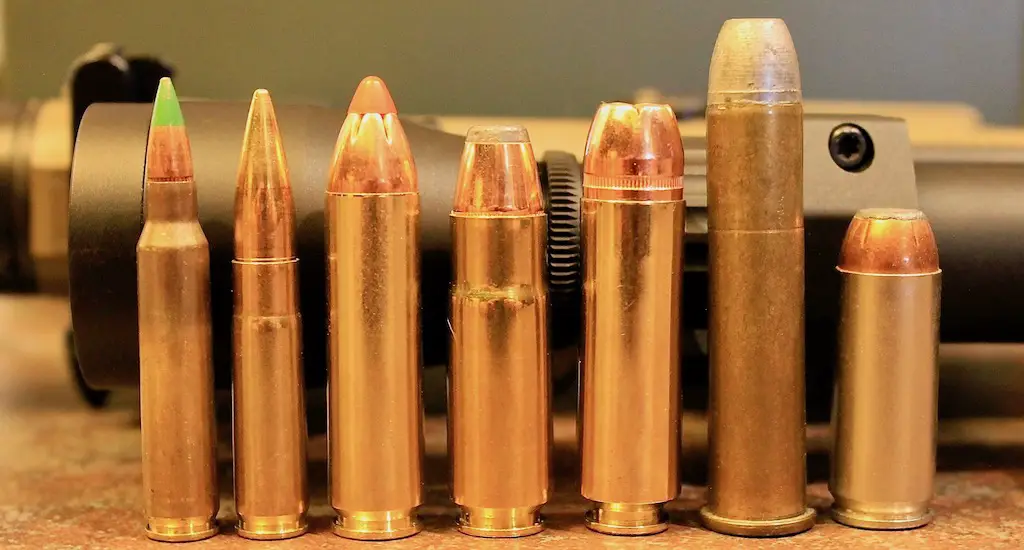
450 Bushmaster vs 458 SOCOM vs 50 Beowulf: Rifle Selection
Just like with ammo, rifle availability for those three cartridges is very uneven. The same goes for the quality of rifles available, which varies considerably.
Once again, the .450 Bushmaster is the most widely available and multiple companies produce good rifles chambered in that cartridge. On the other hand, only a few companies make firearms chambered in .458 SOCOM and .50 Beowulf.
Bushmaster was the first gun manufacturer to produce firearms in .450 Bushmaster, Tromix was the original firearms manufacturer for the .458 SOCOM, and Alexander Arms developed the first rifles in .50 Beowulf. All of those companies still make very good quality firearms chambered in their respective cartridge.
In addition to Bushmaster, Ruger also produces their semi-automatic AR-556 in .450 Bushmaster. CVA produces their single shot Hunter and Scout rifles in the cartridge. The same goes for Savage and Ruger with their bolt-action 110, American Ranch, and Gunsite Scout rifles.
SBR and Rock River are both known for making good quality rifles in .458 SOCOM. On the other hand, Alexander Arms remains the primary source of rifles chambered in .50 Beowulf.
BUY AN OUTSTANDING 450 BUSHMASTER HUNTING RIFLE HERE
BUY A QUALITY 458 SOCOM HUNTING RIFLE HERE
BUY A QUALITY 50 BEOWULF HUNTING RIFLE HERE
50 Beowulf vs 450 Bushmaster vs 458 SOCOM Magazines
We can’t have a 450 Bushmaster vs 458 SOCOM vs 50 Beowulf comparison without discussing the magazine situation for each cartridge.
All three cartridges can use standard 30 round AR-15 magazines with varying amounts of reliability and different magazine capacities: 13 for the 450 Bushmaster, 10 for the 458 SOCOM, and 10 for the 50 Beowulf.
That said, it’s sometimes necessary to modify the feed lips, spring, and/or the follower of a typical AR-15 magazine for optimum reliability with these bigger bore cartridges.
Additionally, all of these cartridges are known for having reliability issues when used with poor quality magazines in general. In fact, magazines may be the single biggest cause of feeding problems with the 450 Bushmaster, 458 SOCOM, and 50 Beowulf.
Fortunately, this is a simple and relatively inexpensive problem to solve.
Duramag makes good quality 5 and 7 round 450 Bushmaster magazines. Bushmaster and Ruger both make good 5 round magazines. I’d say Duramag probably has the best reputation, but the Bushmaster and Ruger brand magazines aren’t bad either.
All three brands are available below.
BUY EXCELLENT 450 BUSHMASTER MAGAZINES HERE
Once again, those Duramags are probably the best bet for the 458 SOCOM as well and you can get a 10 round magazine for that cartridge below.
BUY OUTSTANDING 458 SOCOM MAGAZINES HERE
It’s tough to beat anything from Alexander Arms when it comes to 50 Beowulf magazines, though some people really like the Duramags from C Products Defense for this cartridge as well.
You can get 50 Beowulf magazines in sizes varying from 4 to 10 rounds from Alexander Arms and C Products Defense below.
BUY SOME GREAT 50 BEOWULF MAGAZINES HERE
450 Bushmaster vs 458 SOCOM vs 50 Beowulf: Which Is Right For You?
As previously discussed, the .450 Bushmaster, .458 SOCOM, and .50 Beowulf all offer performance comparable to the .45-70 from an AR platform.
They’re all very effective on a wide variety of game at short to moderate range. As a general rule, if you’d feel comfortable hunting it with a .45-70, then you can probably ethically hunt it with any of these cartridges as well. So, deer, feral hogs, and black bear are all fair game with any of them. With the right bullets, they’re also suitable for larger and tougher game as well like moose and brown bear.
Especially when chambered in a handy, short barreled semi-automatic rifle, they are all absolutely deadly on a wide variety of game at close range and offer hunters a pretty fast follow-up shot. This is why all three cartridges are relatively popular for feral hog control.
All three are also excellent choices for law enforcement and home defense use.
However, don’t confuse any of them, even the relatively high velocity .450 Bushmaster, with a flat shooting, long range cartridge on par with the 7mm Remington Magnum or .300 Winchester Magnum. They’re all best suited for hunting situations involving shots at less than 250 (or even 150) yards.
Finally, the .450 Bushmaster and .50 Beowulf are also somewhat popular with hunters in the mid-west who are restricted to using straight walled cases during deer season.
Specifically, I’m referring to states like Iowa and Ohio that require hunters to use a straight-walled cartridge during the modern firearm deer season. This also applies on public land in Indiana as well as in parts of southern Michigan.
Do you primarily hunt deer sized game at ranges less than 200 yards? All three cartridges will work extremely well under those conditions and there is very little difference between them at short range. Go with the .450 Bushmaster if you want a bolt-action rifle or a wider variety of hunting ammo to choose from.
Do you want to hunt larger game animals like elk, moose, or brown bear? Once again, all of these cartridges will work at short range, but I’d personally lean towards the .458 SOCOM here because Barnes produces their 300gr TTSX bullet specifically for that cartridge. That’s an outstanding bullet and can be counted on to get the job done if you place your shot correctly. All that said, all three cartridges are on the light side for cape buffalo hunting, so use them for that task at your own risk.
Do you hunt in a state that restricts rifle deer hunters to using a straight walled cartridge? The .450 Bushmaster and .50 Beowulf are usually permitted in these states and are more than powerful enough to get the job done during any conceivable deer hunting situation.
Even though they have slightly different pros and cons, the .450 Bushmaster, .458 SOCOM, and .50 Beowulf are all great rifle cartridges, particularly for hunters fond of the AR platform. While the differences between them (450 Bushmaster vs 458 SOCOM vs 50 Beowulf) are relatively large in a few areas, they’re all good choices for a wide range of hunting tasks.
Get a nice hunting rifle chambered in the cartridge that you think fits your needs the best, learn to shoot it well, use quality bullets, and you’ll be well prepared for most common hunting situations.
Want to take a rifle chambered in one of these cartridges on a hunt?
Book a great Africa safari hunt here.
Enjoy this article comparing the .450 Bushmaster, .458 SOCOM, and .50 Beowulf cartridges? Please share it with your friends on Facebook and Twitter.
The Lyman 50th Edition (p348-349, 350-351, p373-374), and Hornady 10th Edition (p751-753, p776-777) reloading manuals were also used as references for the history of the cartridges and provided data to compare their size and recoil. The data used to compare the trajectory and wind drift of the cartridges was obtained from Midway USA (here, here, and here), Hornady, and Buffalo Bore. Maximum pressure obtained from SAAMI (p171 and p172). I used the Hornady Ballistic calculator and ShootersCalculator.com to compare wind drift and recoil for the cartridges.
Make sure you subscribe to The Big Game Hunting Podcast and follow The Big Game Hunting Blog on Facebook, Instagram, Twitter, and YouTube
NEXT: 223/5.56 vs 7.62×39: WHAT YOU NEED TO KNOW
NEXT: 101 BEST GIFTS FOR HUNTERS
John McAdams is a proficient blogger, experienced shooter, and long time hunter who has pursued big game in 8 different countries on 3 separate continents. John graduated from the United States Military Academy at West Point and is a veteran of combat tours with the US Army in Iraq & Afghanistan. In addition to founding and writing for The Big Game Hunting Blog, John has written for outdoor publications like Bear Hunting Magazine, The Texas State Rifle Association newsletter, Texas Wildlife Magazine, & Wide Open Spaces. Learn more about John here, read some of John’s most popular articles, and be sure to subscribe to his show: the Big Game Hunting Podcast.

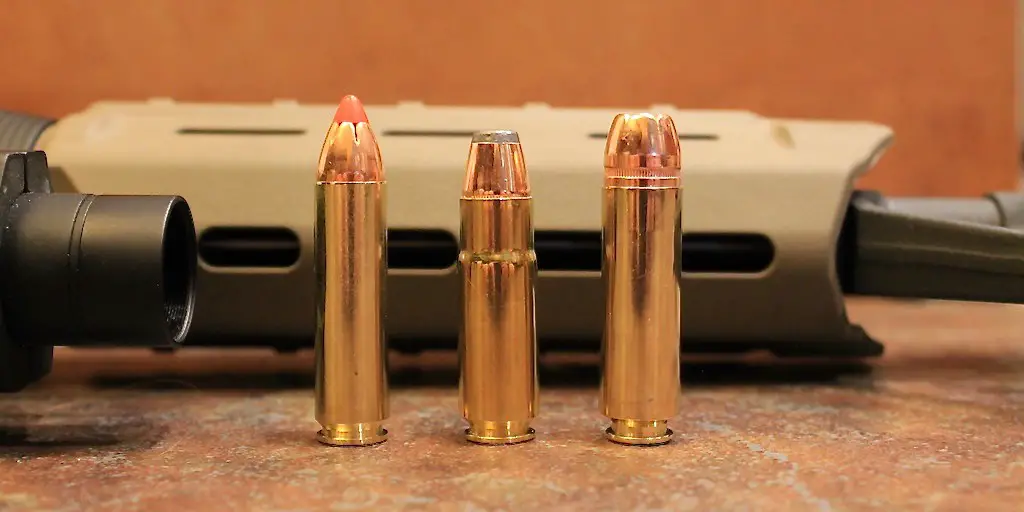
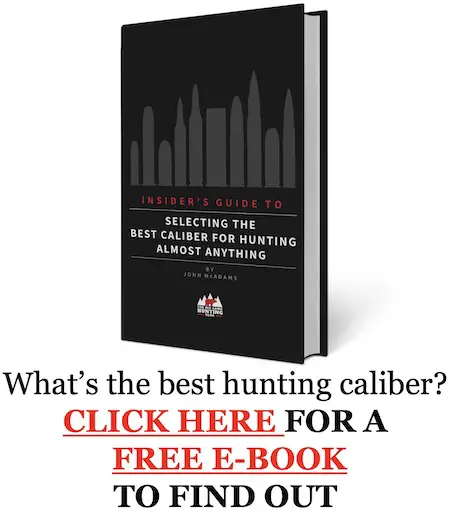
Thanks , john for the information on big bore guns . i,m building a lower for a big bore and have not made a decision on which caliber upper to install . i done a lot of research on ammo on all 3 calibers . looks like your right about the availiblity of ammo on all 3 looks like the 450 may be the best way to go to begin and with a lower built with big bore in mind , i can always pin one of the other 2 on . thanks jim
Which one is better in a shorter barrel, like 16 inches?
The .458 SOCOM or the .50 Beowulf are both generally better than the .450 Bushmaster in a shorter barrel.
The one point I’d add is that the .458 was designed specifically to function using GI mags, of which I and most of my friends own many. A 30 round AR mag for 5.56/.223 is a 10 round .458 mag. I see mags for .450 advertised at $27.00 apiece.
A well made point on the GI Mags. Which if you happen to live in CA (Communist America or Kalifornia), which I used to, is an excellent point to consider.
A .458 SOCOM upper, allow you to keep any 30 round (5.56) mags you might have “owned or now maintain”. They are now 10 round mags for your .458 Upper. Made a nice stencil and marked the magazines with “.458 SOCOM Only” mark while living there. Any law enforcement officer or court would be hard pressed to dispute “your clear intentions” of having those magazines in your possession.
So glad to be out of that state and back to living in the great state of Maine, a gun freedom mecca.
I’m very interested in a Big Bore AR Pistol for personal protection / home defense work. I’ve been looking at all 3 cartridges listed but don’t have a ton of information on how they would perform out of a 10″ barrel with supressor or something similar. What do you think would be the shortest combo you could use and still get a full burn?
Really like the info. Thx
Glad you enjoyed it!
John